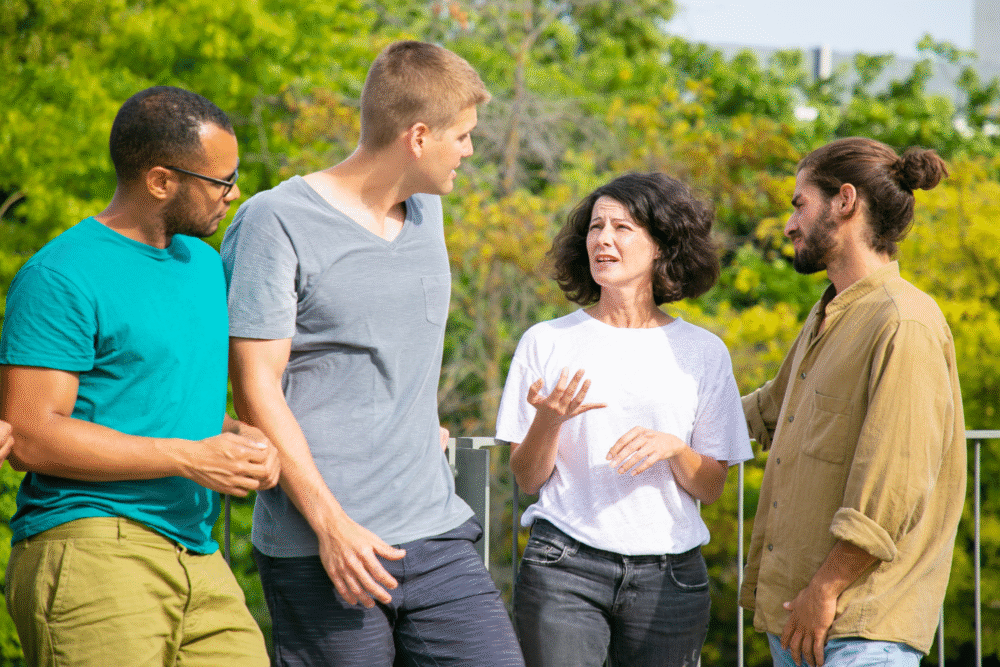The world may praise the ruthless, but empathy is still your quiet superpower.

You’re not imagining it—kindness is starting to feel like a liability. It’s like the colder you act, the more you’re rewarded. People who bulldoze boundaries, shut down feelings, or laugh at vulnerability seem to get ahead, while those who care deeply often feel overlooked or dismissed. And if you’re someone who still wants to lead with empathy, it can feel like you’re swimming upstream while everyone else is floating on a raft of indifference. Maybe you’ve even wondered, Am I just too soft for this world? You’re not. The problem isn’t you—it’s the emotional frostbite creeping through a culture that keeps telling people to “toughen up” and stop taking things so personally.
You don’t need to harden your heart to survive, and you sure as hell don’t have to mirror the apathy around you. Staying empathetic isn’t weak—it’s quietly radical. You can keep showing up with compassion, even in a world that might not clap for it. And if you’ve been feeling the pull to go numb just to fit in, it’s time to pause and remember what makes you human in the first place.
1. You stop absorbing everyone else’s pain like a sponge—and still care deeply.

Empathy doesn’t mean wrecking yourself emotionally every time someone else is hurting. That’s not compassion—that’s burnout with good intentions. If you’ve been taught that being a “good person” means carrying other people’s suffering like it’s your job, it’s time to take a breath. You can absolutely care without letting it devour you. Imagine empathy as a flame, not a wildfire. You want it to stay lit, not scorch everything in its path. The key is boundaries—not walls, but healthy filters. You can listen, offer support, and genuinely feel for someone without sinking into their emotional quicksand. When you start recognizing the difference between compassion and emotional codependency, you protect your own heart while keeping it open, according to Dr. Chris Mosunic, PhD, RD, MBA at Calm.
That’s powerful. It lets you show up for people without going numb or overrun. And if someone tries to guilt you for not “doing more,” remember—real empathy doesn’t need to perform. It just needs to show up with presence and care. Protecting your emotional space isn’t selfish. It’s what lets your empathy stay alive long after the culture tells you to shut it down.
2. You choose connection over cleverness, even when it’s not trendy.

You know the game: be sharp, be snarky, outwit everyone. Quick comebacks get laughs, and sarcasm is basically currency. But that stuff wears thin fast. There’s nothing wrong with being clever, but when it replaces real connection? That’s when things start to rot. You’ve probably felt it—those conversations that leave you cold, even though everyone was “on.” It’s because no one actually showed up. Everyone was busy performing. Empathy asks you to stop trying to win and start trying to understand, as reported by Ashley Abramson at the American Psychological Assocation. That might mean asking a real question instead of making a joke. It might mean not taking the bait when someone’s trying to one-up you in a debate. And yeah, sometimes it’ll feel awkward.
Sometimes it’ll make you stand out in a room full of eye-rollers and cynics. But that’s okay. Because real connection lives where the armor comes off. You don’t need to be the funniest or smartest person in the room. You just need to be the one who sees people clearly and treats their feelings like they matter. That’s what makes you unforgettable.
3. You stop mistaking emotional detachment for strength.

There’s this idea floating around that the less you care, the more powerful you are. Like if you can shrug off pain or pretend not to feel things, you’ve somehow “leveled up.” But who decided that apathy is impressive? Honestly, it’s lazy. Anyone can disconnect and float above it all. Real strength is feeling the full weight of something and choosing to stay soft anyway. It’s easy to build walls. It’s much harder to stay present and vulnerable when things hurt. But that’s where the magic happens. You don’t need to numb out to survive. In fact, you’re more alive when you don’t. Being emotionally available doesn’t mean you’re unstable—it means you’re brave enough to stay human, as stated by Claire Cain Miller at The New York Times.
And if the world around you tries to shame that or tell you to “man up” or “stop being dramatic,” that’s on them. Empathy is not weakness. Feeling deeply doesn’t make you fragile—it makes you fierce in a way the numb crowd will never understand. They’re surviving. You? You’re still living. And that’s the real flex.
4. You refuse to treat kindness like it’s a business transaction.

Too often, people are only kind when there’s something in it for them. Compliments come with strings, favors come with expectations, and empathy is doled out like currency—only if there’s a return on investment. But that’s not how real empathy works. If you’re only showing up when there’s something to gain, you’re not being kind—you’re being calculated. The truth is, empathy might not always get you anything back. Sometimes, you’ll offer a shoulder to cry on and be forgotten the next day. You might forgive someone who never says thank you. You’ll probably give more than you get. But you keep doing it because it’s who you are—not because you’re tallying points.
When you let go of the scoreboard, you free yourself from the disappointment game. You start acting from your values instead of your ego. That kind of kindness doesn’t just feel better—it is better. And eventually, it starts changing the people around you too. Not always loudly, not always quickly—but consistently. Quietly. And that’s the kind of impact no one can take from you.
5. You speak up when silence would be easier.

Empathy isn’t always soft. Sometimes, it looks like saying the uncomfortable thing when no one else will. It’s calling out cruelty, even if it makes you unpopular. It’s standing next to someone who’s being treated like trash and saying, “This isn’t okay,” even when your voice shakes. That kind of courage doesn’t always come with applause—in fact, it rarely does. Most people will avoid the conflict. They’ll stay silent, or worse, laugh along. But empathy knows that silence can be a weapon, too. If you’ve ever watched someone suffer in a room full of quiet people, you know how sharp that silence can be.
Speaking up might make you the odd one out. You might feel exposed, shaky, or even scared. But you’re also the one who refuses to let comfort be more important than compassion. That’s not weakness—that’s leadership. You’re showing others it’s possible to care out loud. And that matters. Because in a culture that rewards cruelty, speaking up with empathy isn’t just brave—it’s revolutionary.
6. You take time to understand instead of rushing to judge.

We live in a world that’s quick to cancel, label, and dismiss people with a single soundbite. It’s easier to react than to reflect. But empathy asks you to slow down and actually try to get the full picture. That doesn’t mean you excuse bad behavior or let people off the hook. It just means you leave room for the fact that everyone’s carrying something you don’t see. Maybe that rude cashier just lost someone they love. Maybe your friend snapped because they’re overwhelmed.
Maybe that angry comment came from someone who’s never been heard. When you pause and wonder what’s behind this? instead of jumping to what’s wrong with them?—you’re practicing real empathy. It takes discipline to not default to outrage or judgment. It takes patience to listen with the goal of understanding instead of reacting. And you won’t always get it right. But just trying to understand someone’s pain—even a little—creates a kind of emotional intelligence this world desperately needs more of. You’re not giving people a pass. You’re giving them humanity.
7. You protect your empathy from emotional vampires.

Caring about people doesn’t mean letting them suck you dry. If you’ve got a big heart, chances are someone’s taken advantage of it. Some people aren’t just struggling—they’re draining. They never take responsibility, always play the victim, and make you feel guilty for having boundaries. That’s not empathy—that’s manipulation. You can love people and still protect your peace. You can care deeply and still walk away. In fact, the more you protect your own energy, the more authentic your empathy becomes. When you stop trying to fix everyone or carry burdens that don’t belong to you, your kindness becomes clearer, stronger, and way more sustainable.
Don’t confuse being constantly available with being deeply compassionate. Real empathy knows when to lean in and when to step back. And if someone guilts you for stepping back, it probably means you’ve been overgiving. The people who truly value you will respect your need to breathe. You’re not a 24/7 emotional gas station. You’re a person—with limits, needs, and the right to protect your own inner calm.
8. You feel your feelings instead of numbing out.

When the world feels overwhelming, it’s tempting to check out. Binge shows. Scroll endlessly. Pour another drink. Make a joke about it. Anything but actually feel it. But empathy starts with being honest about your own emotions. If you’re numbing everything, you’re blocking your connection to others too. You can’t selectively mute feelings. If you turn down your sadness, you turn down your joy. If you ignore your pain, you can’t recognize someone else’s. It’s not about wallowing—it’s about letting yourself be real.
Feel the grief. Sit with the discomfort. Let the tears come if they need to. When you get in the habit of feeling instead of fleeing, you expand your capacity to be present—for yourself and for others. You’ll start noticing the subtle stuff: the tension in someone’s shoulders, the quiet sadness in their smile. That kind of awareness doesn’t come from being busy or distracted. It comes from being awake. And yes, it’s harder. It’s also richer, deeper, and more human. You can’t fake empathy when you’ve lived in your own depths—and come back softer, not harder.
9. You listen to understand, not to respond.

You know the drill—someone starts talking, and your brain is already crafting your comeback, your advice, your next witty comment. It’s so normal we don’t even notice we’re doing it. But when you listen just to reply, you miss what’s really being said. Empathy slows you down. It invites you to stop performing and actually hear the person in front of you. Sometimes people don’t need solutions—they need space. They don’t want advice—they want to feel seen.
That awkward silence you rush to fill? It might be the exact space they needed to say the hard thing. Listening with empathy means putting your ego in the back seat. It means you stop rehearsing and start receiving. You’ll be amazed how much people open up when they sense you’re not rushing them or judging them. And yeah, it might take longer. But it’s worth it. Because when people feel heard, they soften. And when you really hear someone, it changes how you relate to them. That kind of listening builds trust, heals wounds, and flips the script on shallow conversation.
10. You choose hope over cynicism, even when it feels naive.

Cynicism is easy. It’s cool. It makes you sound smart. But underneath that sarcastic shrug is usually fear, disappointment, or exhaustion. Hope, on the other hand, requires guts. It asks you to believe that people can change, systems can improve, and kindness still matters—even when you’ve seen the worst. Empathy thrives in hopeful soil. If you’ve decided everyone’s awful and nothing will ever get better, it’s hard to keep caring.
But hope isn’t about ignoring reality—it’s about refusing to let darkness define it. You don’t need to be blindly optimistic. You just need to believe that trying still counts. That small efforts add up. That soft hearts aren’t pointless. When you choose hope, you keep your empathy alive. You stay open to being surprised, moved, inspired. That doesn’t mean you won’t get hurt—but it means you won’t become what hurt you. And in a culture that worships detachment and eye-rolls, staying hopeful is its own quiet kind of rebellion. It says, “I still care—on purpose.” And honestly, that’s the bravest thing you can do.
11. You show up for people even when it’s inconvenient.

It’s easy to be supportive when it fits into your schedule. But real empathy sometimes asks you to rearrange your plans, sacrifice your comfort, or show up when you’d rather not. That doesn’t mean saying yes to everything or burning yourself out—but it does mean being willing to lean in when someone truly needs you. Maybe that means answering a call at midnight. Maybe it’s sitting with someone through their grief, even when there’s nothing you can do. It might not feel like much, but your presence can be a lifeline.
The trick is knowing when it’s a true call to show up—and when you’re just being guilted into something. Discernment matters. But once you know it’s real? Be there. Even if you feel awkward. Even if you’re not sure what to say. People remember who was in the room when it got hard. And you don’t need perfect words—you just need to be the kind of person who stays. That kind of empathy lasts longer than the moment. It echoes in ways you’ll never fully realize.
12. You stay soft in a world that keeps telling you to harden up.

Everywhere you look, someone’s preaching toughness. “Don’t let anyone walk on you.” “Put yourself first.” “Cut off anyone who’s not adding value.” Sure, boundaries are healthy. But when self-protection becomes your whole personality, you start shutting out the very thing that makes life rich—connection. Empathy isn’t about being a doormat. It’s about staying open without dissolving. It’s saying, “Yes, I’ve been hurt—but I’m not going to become unfeeling just to avoid it happening again.” That takes guts. It means choosing tenderness again and again, even when the world rewards cruelty, sarcasm, and stone-cold independence.
But softness isn’t weakness—it’s resilience in its most courageous form. You can still be strong and vulnerable, grounded and compassionate. The two aren’t opposites—they’re partners. And when you stay soft on purpose, you give others permission to do the same. That’s how change happens. Not through shouting matches or stone walls—but through one person choosing empathy when it would’ve been easier to shut down. If that’s you? Don’t underestimate your impact. You’re doing more than you think.
